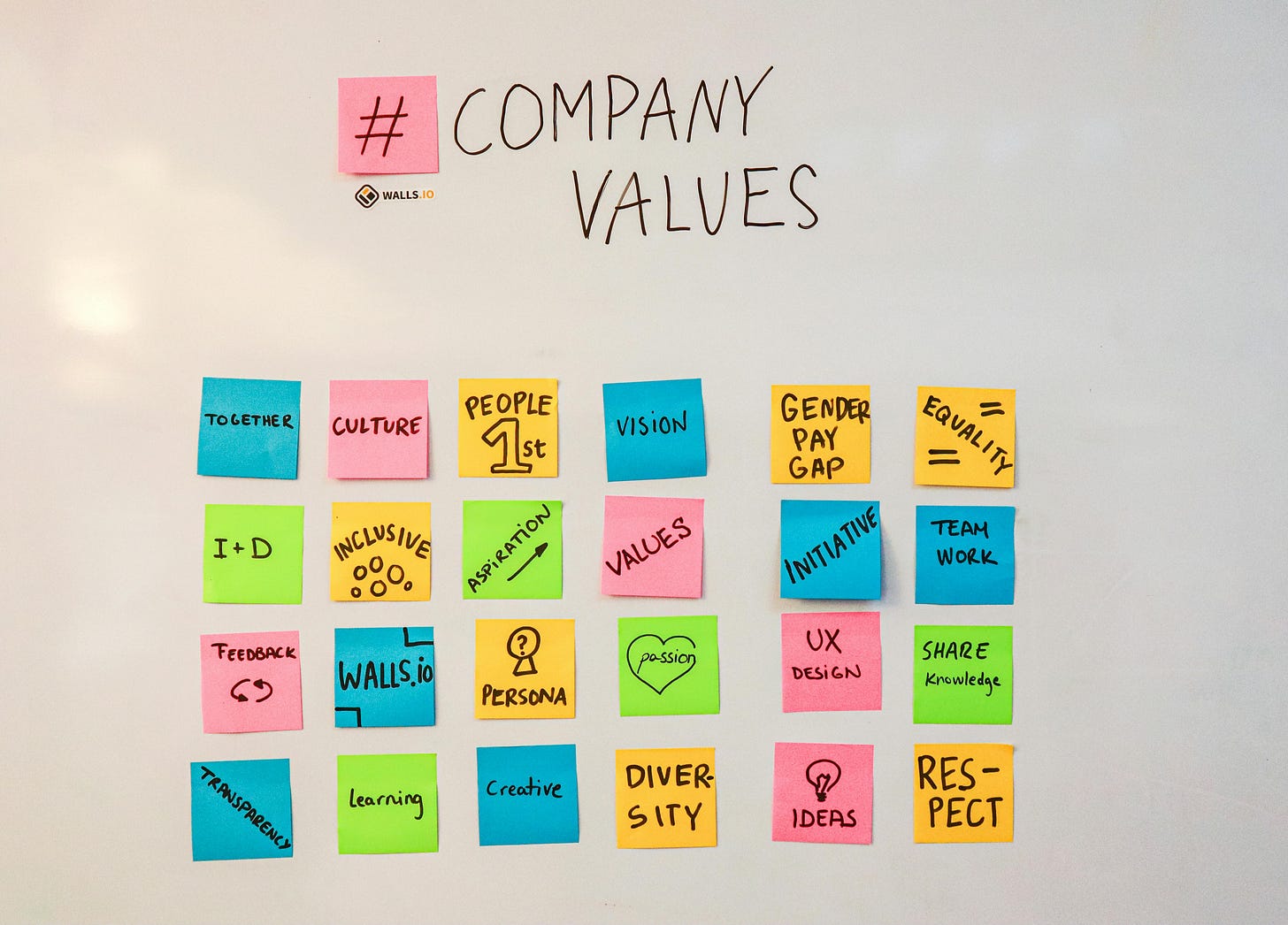Last semester in a discussion about employee relations a student asked me about the situation in which an employee’s values don’t match the company values.
It’s a good question. I think about it personally. I myself have had to say publicly that I get my values from God and not my employer.
Nevertheless companies talk a lot about their “values.”
The Institute for Public Relations Study recently addressed this question and shared a study on the subject. Of interest is that a third to almost a half of employees, by different age groups, said their company’s values aligned with their own “somewhat” or “not at all.”
My question is “should they?” And if so, what specific types of values?
I would say values should be categorized as collective vs. individual, or organizational vs personal.
Collective or corporate (i.e. any organization, not just a corporation) are universal, related to an organizations mission, and not likely to violate a personal value. Examples of these would be that the customer comes first, quality is job one, we try harder. Values related to how a job is done, operational goals, and organizational culture.
Personal or individual values are based on more deeply held beliefs associated with an individual’s own identity. These are associated with an individual’s family, ethnic or national culture, faith, and other things that precede and supersede the workplace. Often these values are related to the hot topics debated in society that are not directly related to one’s job.
So when a company “takes a stand on social issues,” which stand do they take? Are they conscious of the unintended consequence that stand serving as a proclamation to some employees—and other stakeholders—that their personal values-based position on said issue is not valued, welcomed, accepted? Such employees will go from ambassador to stranger, they will go from being proud of their job to seeing it as just a paycheck, and maybe a temporary relationship on the path to something where they don’t feel insulted.
Getting employees to identify with employer is great to some extent. We spend significant amount of time at work, one of the first things people ask you is what do you do or where do you work? I have read academic research about going beyond employee engagement to employee-organization identity fusion. That sounds a little extreme to me, as if a person gives up their individual identity in order to blend into a workplace. That is more akin to an authoritarian regime than the “value” of individual autonomy and diversity.
Indeed, it is useful to foster a positive culture, one in which employees are engaged, productive, happy and serve as brand ambassadors even beyond the work setting. They can be proud of where they work, and even should be. But a profession and particular job is but one aspect of identity. I would even say it is secondary, marginal, and circumstantial.
Personal identity is deeper, more permanent. You can change jobs, it is harder to change your ethnicity, faith, and other aspects of personal identity. If implied one must do the latter they are increasingly likely to do the former.
The noble thing for companies to do, therefore, is work toward values that are appropriate for the mission of the organization as an aspect of organizational culture. But they should maintain and even be upfront about having institutional neutrality on the topics of our day that reflect a personal value. They should seek with intention a balance of being both non-discriminatory AND non-celebratory of any personal values.
This may be different in the case of small or privately owned enterprises, in which an owner will publicly proclaim their personal values or even make them part of the organizational values. This could be a follower of Jesus Christ or an avowed secular humanist. I’ve seen both. That is up to them. But in either case they will both attract and repel employees on the bases of personal value, as opposed to business metrics such as product or service quality, customer service and others.
Of course, many non-profits were founded and exist entirely around a cause that is intimately related to a value that is deeply personal. These could be as disparate as advancing the Christian Gospel or advocating for abortion. Here it would be ethical to be clear about a non-profit organization’s purpose, and it will affect who applies for jobs, volunteers and donates to the organization.
But behind alignment with core mission, neutrality on unrelated personal matters should be an organizational value with which most individuals can agree. I have written about the virtue of neutrality before.
A term related to values that is expressed often in recent years by corporations and CCOs is “purpose.” Purpose generally defined is beyond mission and considers the positive role an organization plays in society. In discussing this concept at length, Ranjay Gulati in his book “Deep Purpose” offers a cautionary note that echoes what I have been saying: “Culture should not coerce conformity. It should seek to find an overlap between personal passion and company goals. The best cultures facilitate individuality.”
Gulati also offers prudent advice about articulating values generally and enabling individuals to enact them. This is more like guidelines than rules and can help avoid a corporate value trampling on individual values. Among the many examples in the book he mentions Apple under Steve Jobs: “As we’ve seen, Steve Jobs helped create Apple University with the goal of training people not to think exactly as he did, but rather to understand his guiding principles and mindset and apply them using their own judgment in the leader’s absence.”
My answer to the student in class was brief and basically asked students to consider that there are differences between corporate and personal values. I did acknowledge that it was a good question and I have more to say on the subject. I’ve done that here, and I hope PR and other management professionals will give consideration to the difference.




